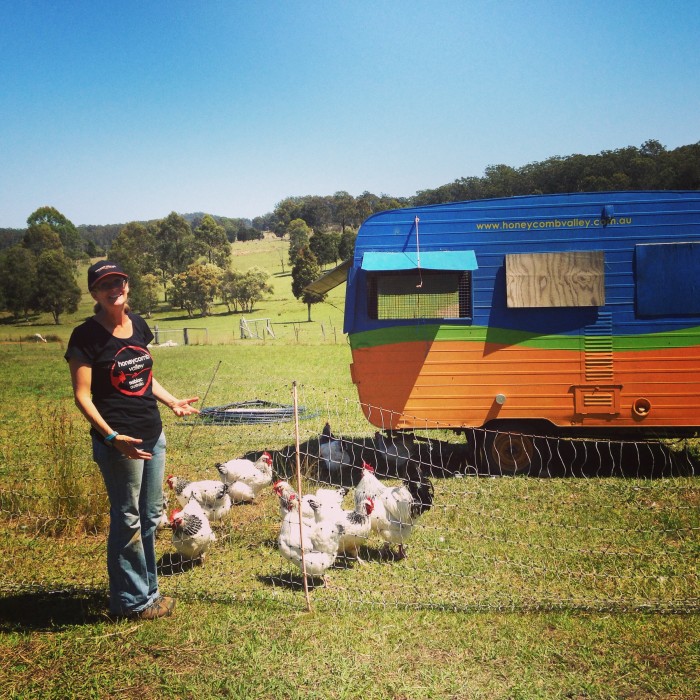The good life

Honeycomb Valley Farm is all about sustainable living.
Just a few hours from the neon of Sydney, and it feels like we’re in the Land That Time Forgot. Being out of range and miles from care is really crucial when it comes to getting a feel for the King’s Creek Retreat.
It’s easy for this place to get under your skin. It’s where seeds are sown, where friendships are formed around the wavering flames of an open fire and where the pine-scented air will beckon long after we’re back on the hamster-wheel of our big-city working lives.
Like the evening before, the morning is spent staring into the fire and patting Frodo, the dog, who pinballs between us, waiting for a pat. When it’s time to say goodbye to owner Carla Hickman and the King’s Creek Retreat, Frodo bounces along in our wake as if to agree with Carla, who says she hopes we will be back soon, loading us up with a carton of farm-fresh chook eggs.

Honeycomb Valley Farm offers a taste of the sweet life.
Our next stop on the Legendary Pacific Coast Drive is Honeycomb Valley Farm, run by former hotel manager Andrew Campbell and his wife Anna who tired of living in hotels with their three children and opted for a tree change. They bought the 60-acre farm eight years ago and have since set about a new lifestyle, farming sustainably using the principles of permaculture and using their farm as a working example of how to make a difference. In a world where more people put stuff before simple and modern before mucking in, this is the sort of place to visit if you want to feel hopeful about humanity.

Honeycomb Valley Farm shows sustainability in action.
Anna and Andrew are genuine educators. They describe their farm as ‘the little farm with the big picture’. With the gorgeous, gregarious Anna as our guide, we wander through the plant garden, laugh uproariously at the comical newly shorn alpacas, learn useful information about plants and bees, and encourage our two sons to do laps of the Ninja-Warrior-style obstacle course.

The obstacle course offers parents a crash course in raising free-range children.

Nothing goes to waste at Honeycomb Valley Farm.
Just 15 minutes from Forster Tuncurry, and only a couple of minutes off the Pacific Highway, Honeycomb Valley Farm is the perfect detour if you’re travelling between Sydney and Brisbane. But be warned: the last three WWOOFers (willing workers on organic farms) who arrived for a stint of volunteering, chucked in their jobs as accountants in the UK. A visit to the working farm, which is open from 8.30am to 2.30pm each day, inspires and educates on so many levels: see sun ovens sun-blasting the day’s bread, learn how to use plants for the kitchen or as ‘farmer’ceuticals or plant dyes, insect repellants, beverages or building materials and taste an array of incredible local honey produced on the farm. You also get to eyeball the animals:- from Dorper sheep, to Galloway cattle, strutting alpacas, dairy goats and isa chickens – none of which are destined for the chopping block.
We leave Honeycomb Valley Farm not just with jars of yellowbox honey and goat’s milk soap but with a book penned by motivational speaker and author Anna about sustainability leading to real wealth, called Honeycomb Kids. “We bought this farm for our kids. We want to give them the tools and ideas they need to be contributors and not just consumers. We also want visitors to be suitably inspired to discover the joy of sustainable living,” says Anna, who is a poster girl for positive change.
After a quick stop, at Harrigan’s Irish Pub, in Harrington, where we eat oysters fresh from the leases we are overlooking in the Manning Valley, we detour to the Ramada Resort Diamond Beach, where we check in, to check out. The resort, sitting pretty overlooking Diamond Beach, can be reached via a stunning bush track through Khappinghat Nature Reserve.
It’s also where the region’s tagline, from the country to the coast, comes to life and our Manning Valley visit comes to an end.




